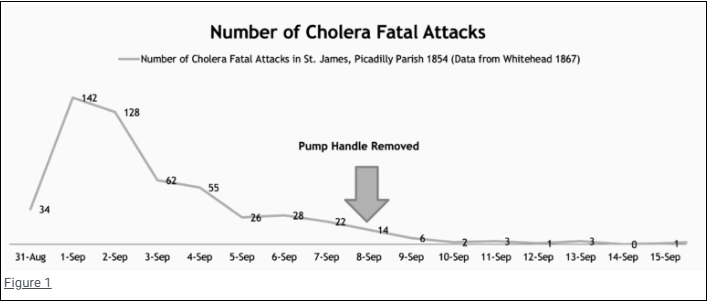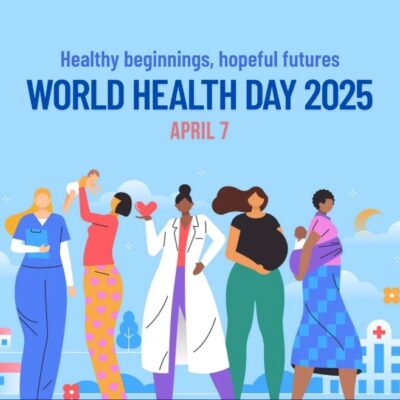e-Bulletin April 2025
MESSAGE FROM THE DIRECTOR |
We all know the story of the legendary John Snow and the cholera outbreak that started on August 31, 1854. Singlehandedly, Dr Snow traced the source and convinced the politicians to remove the Broad Street pump handle on September 8, 1854. Do the math—8 days to solve an outbreak and simultaneously invent the science of outbreak investigation, and translate science to policy.
Here is what happened next. The people of London put the handle back on the pump! Shallow wells remained a fixture throughout London. Cholera outbreaks kept happening for 30 more years. When London finally put an end to cholera, it did so based on a wider acceptance of Snow’s waterborne theory. This was the result of street-level health communication by sanitarians who spread this idea in salons and pamphlets. Edwin Lankester became the first Medical Officer of Health for the Broad Street neighbourhood and devoted himself to knowledge exchange to the people of London. (Lankester, 1866).
Hero scientists and temporarily persuaded politicians are no match for low health literacy and populism in the short run. We see this in action all over the world today. Carrying on the tradition of Lankester, our field has supplemented epidemiology, lab science, statistics, and physiology, with the science of communication, trust and partnership formation. Building the public’s health literacy takes time, but it is bedrock of resilience. We have had these resilience building social science tools in public health for over a century (Nathanson, 1996). They are part of what we teach our undergraduate and masters students. An interdisciplinary school like ours is an anvil to forge stronger steel by combining the metal of engaging with our community with the iron ore of science.
Our School’s celebration of Public Health Week saw our amazing anvil in action. We unite public health practitioners from government bureaus, clinics, and NGOs with new knowledge about what threatens our health and what makes us resilient. Our school welcomes the world’s John Snows and Edwin Lankesters. Together we create the conditions in which people can be healthy.
Bonus Quiz Question:
Figure 1 shows the epidemic curve from 1854. True or False? The removal of the Broad Street pump handle ended the cholera epidemic of 1854.

Professor David Bishai
Director and Clinical Professor
School of Public Health, The University of Hong Kong
References:
- Disease Prevention as Social Change: Toward a Theory of Public Health.
Population and Development Review, 609-637.
Nathanson, C. A. (1996) - Cholera: What Is It? and How to Prevent It.
G. Routledge and sons.
Lankester, E. (1866)
RECOGNITION |
Promotion of Professor Hui-ling Yen
Celebrating a Remarkable Career Milestone
We are pleased to share the news that Professor Hui-ling Yen has been promoted to Professor with effect from March 2025.
Professor Yen joined the University in 2009 as a Research Assistant Professor and was promoted to Assistant Professor in 2012 and Associate Professor in 2018. Her research focuses on understanding factors driving respiratory virus transmission through laboratory and field studies, aiming to disrupt the “agent-host-environment interactions” critical for viral spread. Her work has significantly advanced the understanding of transmission of influenza and SARS-CoV-2. Professor Yen’s research expertise centers around the use of animal models to study viral pathogenesis and transmission. During the COVID-19 pandemic, her ground-breaking research using the golden hamster model, published in Nature (2020), provided critical insights into SARS-CoV-2 transmission and pathogenesis, shaping global public health responses. Additionally, she works with interdisciplinary teams to study transmission modes within and between species, viral adaptation during host switching, and molecular changes linked to antiviral resistance.
On teaching, Professor Yen is the lead course coordinator for “Emerging Infectious Diseases and One Health” in the MPH curriculum and “Outbreak Investigations” in the MBBS curriculum.
Professor Yen’s exceptional contributions have been widely recognised. She has been listed as one of the world’s top 1% scholars and a “Highly Cited Researcher” by Clarivate in recent years. In 2024, she was awarded the HKU Rosie Young 90 Medal for Outstanding Young Woman Scholar. She also serves as a committee member of the antiviral group at the International Society for Influenza and Other Respiratory Virus Diseases (ISIRV) and contributes to WHO working groups.
The School extends our heartfelt congratulations to Professor Yen on this significant milestone in her career.
Promotion of Professor Peng Wu
Honouring Dedication and Impact
We are pleased to announce the promotion of Professor Peng Wu to Associate Professor, effective April 2025. This achievement is a testament to her outstanding contributions to the field of epidemiology and her dedication to advancing our understanding of respiratory viral infections including COVID-19 and influenza, bacterial infections, antimicrobial resistance (AMR), and emerging diseases.
Professor Wu joined our School in 2010 after receiving her PhD in Infectious Disease Epidemiology from HKU. She has made significant contributions to both research and education. Her collaborative spirit and leadership have fostered international research collaborations, addressing critical public health challenges, such as SARS-CoV-2, avian influenza A(H7N9) and A(H5N6), and antimicrobial resistance. Her research has provided significant insights into both emerging and endemic viral infections, directly informing the design and implementation of effective public health measures.
Her research has significantly impacted global health initiatives, particularly through her work with the WHO Collaborating Centre at the School. With an impressive scholarly record of 149 peer-reviewed publications and over 22,400 citations, Professor Wu was recognised as one of the “World’s top 1% scholars and highly cited Researchers” by Clarivate Analytics in 2024.
Since 2015, Professor Wu has been teaching the core course of the “Control of Infectious Diseases” concentration and advising capstone projects of our MPH programme. Currently, she serves as the primary supervisor for six research postgraduate students and mentors two postdoctoral fellows.
The School extends our warmest congratulations to Professor Wu on this remarkable achievement.
Celebrating C2i’s Award-Winning Research Breakthroughs
The 50th International Exhibition of Inventions of Geneva 2025
We are thrilled to announce our Centre for Immunology & Infection (C2i) team has achieved exceptional recognition at the 50th International Exhibition of Inventions Geneva 2025, winning one special grand prize, three Gold medals, and one Silver medal for their groundbreaking research in public health innovation.
Special congratulations to Professor Leo Poon and Dr Alex Chin for their influenza vaccine project, honoured with both the Saudi Innovation Excellence Prize and a Gold Medal with Jury Congratulations. We equally applaud Professor Michael Chan and his team for their outstanding contributions on lung injury therapies, receiving both a Gold Medal with Jury Congratulations and a Silver Medal.
These awards highlight our commitment to advancing public health innovations and impactful biomedical research on the global stage.
The School extends our heartfelt congratulations to all the award winners for this well-deserved international recognition.
Award-Winning Projects
Special Grand Prize – Saudi Innovation Excellence Prize
Gold medal with Jury Congratulations
Live-attenuated influenza vaccine with alpha-1,3-galactosyltransferase expression to enhance immune response
Led by Professor Leo Poon and Dr Alex Chin
Gold medal with Jury Congratulations
Hypoxia-primed mesenchymal stromal cells and their derivatives enhance lung injury repair
Led by Professor Michael Chan, Dr Angel Ma and Dr Rachel Ching
Gold medal
Broadly protective live-attenuated influenza vaccine by codon usage bias
Led by Professor Leo Poon and Dr Alex Chin
Silver medal
Lactoferrin: from dietary supplement to drug candidate for acute lung injury treatment
Led by Professor Michael Chan, Dr Angel Ma and Dr Rachel Ching
World Health Day
Healthy Beginnings, Hopeful Futures

Visual credit: World Health Organization (WHO)
Every year on April 7, the world comes together to celebrate World Health Day to raise awareness about pressing health issues and promote healthier lives. This year’s theme, Healthy beginnings, hopeful futures, calls on governments and the health community to ramp up efforts to end preventable maternal and newborn deaths while prioritising women’s longer-term health and well-being.
We are proud to showcase projects from our School’s research teams that demonstrate the transformative impact of public health research and policy.
The “Children of 1997” birth cohort, initiated in Hong Kong in 1997, stands as one of the most impactful ongoing birth cohorts in the region. This study has generated over 80 scientific papers, exploring critical public health issues such as the harms of second-hand smoking, the relationship between breastfeeding and childhood hospitalisation for infections, the link between childcare types and obesity risk, and the association between air pollution and pubertal development. These studies have highlighted opportunities to improve women’s health.
With funding support from the Health Bureau, the Research Grant Council of the HKSAR Government, and the WYNG Foundation, a Biobank has been established to archive biospecimens from the birth cohort participants. These samples have been analysed using state-of-the-art high-throughput technologies, including metabolomics, microbiome profiling, proteomics, and genomics, providing invaluable data for understanding disease etiology and informing public health policies.
To enhance its impact, the “Children of 1997” birth cohort is part of several international consortia and collaborative projects, including the NCD Risk Factor Collaboration, the Global Lipids Genetics Consortium, and the Hong Kong Genome Project. These partnerships highlight the global significance of this work and its potential to improve population health worldwide.
Additionally, a research study led by Professor Chao Quan, Clinical Assistant Professor at our School, in collaboration with the School of Nursing of HKUMed, Duke-NUS Medical School (Singapore), and the University of British Columbia (Canada), has highlighted the significant benefits of extending paid maternity leave in Hong Kong.
In 2020, Hong Kong extended its statutory paid maternity leave from 10 to 14 weeks. The study, published in a prestigious healthcare journal Health Affairs, found that this policy change led to a 22% decrease in postnatal depressive symptoms among mothers and a 33% reduction in mothers reporting that baby care interfered with their emotional well-being.
The study also revealed that the extension did not lead to more mothers exiting the workforce. Instead, it supported the retention of highly skilled and educated female workers, demonstrating the dual benefits of the policy for both maternal mental health and workforce stability. These findings underscore the importance of evidence-based policy changes in improving maternal and child health, a key focus area for public health.
As we celebrate World Health Day 2025, we reaffirm our commitment to advancing public health through innovation, collaboration, and education. The challenges we face are complex, but with dedication and evidence-based solutions, we are confident in our ability to drive meaningful changes.
Learn more from our researchers’ publications:
Assessing the safety of lipid-modifying medications among Chinese adolescents: a drug-target Mendelian randomization study
BMC Medicine
Luo, Shan*; Lam, Hugh Simon; Chan, Yap Hang; Tang, Clara Sze Man; He, Baoting*; Kwok, Man Ki*; Leung, Gabriel M*; Schooling C Mary*; Au Yeung, Shiu Lun*
Extended paid maternity leave associated with improved maternal mental health in Hong Kong
Health Affairs
Andres, Ellie Bostwick; Du, Xinyu; Pang, Sharon Sze Lu; Liang, Jiayi Noel; Ye, Jiaxi; Lee, Ming Hin; Tarrant, Marie; Yung, Sofie Shuk-Fei; Johnston, Janice M.*; Lok, Kris Yuet Wan; Quan, Jianchao*
Worldwide trends in diabetes prevalence and treatment from 1990 to 2022: a pooled analysis of 1108 population-representative studies with 141 million participants
The Lancet
NCD Risk Factor Collaboration (NCD-RisC)
Remarks:
* Member of School of Public Health, The University of Hong Kong
EVENT SNIPPETS |
Public Health Forum 2025
Translating Science to Better Health
The School of Public Health hosted the Public Health Forum 2025 entitled “Translating Science to Better Health” on April 12, 2025. The Forum aimed to explore the practical applications of research findings to enhance public health outcomes, bridging the gap between scientific discoveries and real-world impact.
The Forum began with welcome remarks from Professor Zhang Xiang, President and Vice-Chancellor of the University of Hong Kong (HKU), and Professor Chak-sing Lau, HKU Dean of Medicine, who emphasised the vital role of research in advancing public health practice.
The guest lectures were delivered by two distinguished speakers. Professor Hu Qinghua, Deputy Director of Shenzhen Center for Disease Control and Prevention, demonstrated how multi-source disease surveillance systems transform outbreak response. Dr Fan Ning, Founder of Health in Action and Chairman of Forget Thee Not, explored how public health principles extend across professional disciplines.
A key highlight of the Forum was the roundtable discussion, moderated by Professor David Bishai, Director and Clinical Profssor of our School. The discussion featured an esteemed panel of speakers, including Dr Rebecca Grais, Executive Director of Pasteur Network; Professor Yik-ying Teo, Dean of Saw Swee Hock School of Public Health of National University of Singapore; and Professor Eng-kiong Yeoh, Professor of Public Health and Director of Centre for Health Systems and Policy Research at the JC School of Public Health and Primary Care of the Chinese University of Hong Kong. The panel discussed strategies for converting research into community benefits. The discussion sparked thought-provoking conversations and provided actionable insights for attendees.
The Public Health Forum 2025 brought together more than 160 participants, which clearly demonstrated how scientific knowledge can translate into real-world health solutions when researchers, practitioners and students come together. The Forum also featured a poster session, where 50 posters were displayed, showcasing the research and findings of our next-generation public health professionals.
Winners of the Poster Session are as follows:
Best Poster Award
Winner: Ms Tiffany Ma Sze-Wai (PhD)
Poster Title: Suicidal Thoughts and Behaviours in Low- and Middle-Income Countries: A Cross-National Analysis of 17 Countries
First Runner-up: Ms Whitney Au Wing-Yin (PhD)
Poster Title: Effectiveness of a School-based Physical Activity Intervention on Reducing Adiposity and Improving Cardiorespiratory Fitness in Preschoolers with Obesity: Preliminary Results of a Cluster Randomized Controlled Trial
Second Runner-up: Ms Scarlett Lo Hei-Tung (MPhil)
Poster Title: The Effectiveness of a Physical Activity-Embedded Curriculum on School Readiness among Kindergarten Children: Preliminary Results of a Cluster Randomized Controlled Trial
Visit by the International Advisory Board
Advances in Public Health Research and Education
The School of Public Health was excited to receive our International Advisory Board (IAB) members for a visit to our School in late February. Highlights of the visit included a symposium by esteemed IAB members, including Dr Michael Lu, Dean of the School of Public Health at the University of California, Berkeley; Dr Kenji Shibuya, Research Director of the Tokyo Foundation for Policy Research and CEO of Medical Excellence Japan; and Professor Joanna Cohen, Bloomberg Professor of Disease Prevention and Chair of Department of Health, Behavior, and Society, Johns Hopkins University, who joined via video presentation. Their presentations sparked meaningful discussions and provided valuable insights into global health challenges and opportunities.
The visit also included engaging breakout discussions with major stakeholders of our School. These sessions facilitated in-depth exchanges on research, teaching, and collaboration, fostering new ideas and encouraging knowledge sharing. The visit also included a tour to our research centres and laboratories, such as the Centre for Immunology & Infection (C2i), and a meeting with the Hong Kong Jockey Club Global Health Institute (HKJCGHI). In addition, the IAB members met with Deanery of HKUMed as well as Senior Management Team of the University to exchange ideas on public health education and strategic development. This visit underscored our School’s commitment to excellence and continuous improvement in our public health education, research and global collaboration.
The School extends our heartful gratitude to the IAB members for their invaluable advice and contributions.
Shenzhen Center for Disease Control and Prevention Delegation Visit to Strengthen Ties
Enhancing Public Health Cooperation
On April 11, 2025, the Shenzhen Center for Disease Control and Prevention (CDC) delegation visited our School for strategic discussions and a laboratory tour.
During the visit, the delegation engaged in productive meetings with our professors, focusing on key areas of mutual interest including disease transmission patterns, control strategies, and evidence-based prevention approaches. They identified significant opportunities for joint research initiatives and expressed strong enthusiasm for future collaboration.
Central to the discussions was a shared vision of translating academic research into actionable public health policies. This partnership aims to leverage the School’s cutting-edge research capabilities with the Shenzhen CDC’s implementation expertise to address pressing community health challenges.
This visit marks an important step forward in strengthening regional public health capabilities and improving population health outcomes.
IN THE MEDIA |
HKUMed Study Reveals High Muscle Strength Can Prevent Type 2 Diabetes Regardless of Genetic Susceptibility
Stronger Muscles, Lower Diabetes Risk
A research team from our School conducted a large-scale epidemiological study to explore the potential health benefits of high muscle strength in preventing type 2 diabetes (T2D) across varying levels of genetic risk. The study found that higher muscle strength was associated with over 40% lower risk of T2D, regardless of genetic susceptibility to T2D. The study highlights the importance of maintaining or improving muscle strength as a key strategy for preventing T2D. The findings were published in BMC Medicine [link to the publication].
The findings indicated that, compared with low muscle strength, individuals with high muscle strength was associated with a 44% lower relative risk of developing T2D, even after taking into account T2D genetic risk as well as other risk factors. Moreover, the research team observed evidence of an interaction between muscle strength and genetic susceptibility to T2D, suggesting that muscle strength may play a role in modifying the impact of genetic risk to T2D onset. The findings further revealed that individuals at high genetic risk of T2D but with high muscle strength could have a lower absolute risk of T2D, compared with those at low or medium genetic risk but with low muscle strength.
‘Individuals in middle-to-late life are at increased risk of type 2 diabetes. However, our study has demonstrated the potential roles of high muscle strength in preventing the future risk of developing type 2 diabetes not only in all individuals, but also in individuals with high genetic predisposition to type 2 diabetes. Our study supports the current public health guidelines which suggest that adults should engage in muscle-strengthening activities for at least two days per week from a disease prevention perspective,’ said Professor Youngwon Kim, Assistant Professor in our School.
IN MEMORIAM |
Remembering Professor Chit-ming Wong
A Tribute to His Academic Legacy
It is with a heavy heart to announce the recent passing of Dr Chit-ming Wong, a respected member of our academic community and a dedicated scholar in the field of public health, and former Associate Professor of our School.
Dr Wong was an esteemed alumnus of HKU. His academic career at the University started in 1982 and spanned several decades. Dr Wong served in the erstwhile Department of Community Medicine as an Assistant Professor since 1993, and as an Associate Professor since 2003 until he retired from our School in 2015. He continued to serve the School as an Honorary Associate Professor post-retirement until 2018.
Throughout his tenure, Dr Wong led numerous impactful research projects, delving into critical areas such as the effects of air pollution on public health, influenza, and environmental health. Notably, he coordinated multi-city studies across Asia, including projects on air pollution and disease burden, which have had a lasting impact on public health policy and practice. His dedication to understanding and addressing these pressing public health issues has made significant contribution to the field.
With a total of 100 papers published in peer-reviewed international journals and a distinguished record of research excellence, Dr Wong’s legacy as a scholar and mentor will continue to inspire generations of public health practitioners and researchers.
We honour the outstanding achievements and exceptional life of Dr Wong. His significant contributions to public health and research have had a lasting international impact. As a valued member of the HKU family, Dr Wong’s work in public health research and education will continue to inspire and benefit our academic community for years to come.
The School extends our heartfelt condolences to his family and all those who have been touched by his remarkable life.

Professor Chit-ming Wong

The following are research papers published by SPH researchers in February and March 2025:
BMC Public Health
Wei, Xiyu; Li, Chao; Liu, Dongyu*; Chen, Jieyi; Ju, Yumeng; Liu, Jin; Liu, Bangshan; Zhang, Yan
BMC Psychiatry
Kwok, Carltin Chun Ting; Lo, Heidi Ka Ying; Chan, Ching Yui; Chan, Joe Kwun Nam; Wong, Corine Sau Man*; Cheng, Calvin Pak Wing; Ho, Chung; Leung, Brian Man Ho; Wong, Wilfred Shone Horn; Yu, Zoe Hoi Shuen; Lee, Edwin Ho Ming; Chang, Wing Chung
Psychological Medicine
Cruz-Gonzalez, Pablo; He, Aaron Wan-Jia*; Lam, Elly PoPo; Ng, Ingrid Man Ching; Li, Mandy Wingman; Hou, Rangchun; Chan, Jackie Ngai-Man; Sahni, Yuvraj; Vinas Guasch, Nestor; Miller, Tiev; Lau, Benson Wui-Man; Sánchez Vidaña, Dalinda Isabel
Addiction
Yao, Ying; Luk, Tzu Tsun; Lau, Oi Sze; Wu, Yongda Socrates; Weng, Xue; Ng, Chak Hang; Cheung, Yee Tak Derek; Lam, Tai Hing*; Wang, Man Ping
Identifying vaccine-hesitant subgroups in the Western Pacific using latent class analysis
npj Vaccines
Choi, Yongjin; Leung, Kathy*; Wu, Joseph T.*; Larson, Heidi J.; Lin, Leesa*
Nicotine & Tobacco Research
Chen, Hong; Luk, Tzu Tsun; Guo, Ziqiu; Yip, Annie On Ni; Cheung, Yee Tak Derek; Chan, Sophia Siu Chee*; Lam, Tai Hing*; Wang, Man Ping
Scientific Reports
Jiang, Jialiang; Lam, Kwok Fai; Lau, Eric Ho Yin*; Yin, Guosheng; Lin, Yun*; Cowling, Benjamin John*
Cardiovascular effect of snoring in asians: What do biobank and genomic studies say?
Respirology
Au Yeung, Shiu Lun*; Goto, Atsushi
MedComm
Zhang, Xi*; Chan, Darren Chak Lun*; Zhu, Jie; Sin, Daniel Zhen Ye; Peng, Ye; Wong, Matthew Kwok Leong; Zhu, Wenyi; Tsui, Yee*; Haqq, Andrea M.; Ting, Joseph Y.; Kozyrskyj, Anita; Chan, Francis Ka Leung
Chaos
Tian, Lue; Wan, Eric*; Celine Chui, Sze Ling*; Li, Shirely*; Chan, Esther*; Luo, Hao; Wong, Ian C. K.*; Zhang, Qingpeng*
Lipids in Health and Disease
Wan, Hongli; Wu, Haisheng*; Wei, Yuxi; Wang, Simin; Ji, Yuqiang
Sustainable Cities and Society
Wu, Gonghua; Wang, Shenghao; Wu, Wenjing; Benmarhnia, Tarik; Lin, Shao; Zhang, Kai; Romeiko, Xiaobo Xue; Gu, Haogao*; Qu, Yanji; Xiao, Jianpeng; Deng, Xinlei; Lin, Ziqiang
European Neuropsychopharmacology
Lo, Heidi Ka Ying; Chan, Joe Kwun Nam; Wong, Corine Sau Man*; Chung, Ka Fai; Correll, Christoph U; Solmi, Marco; Baum, Lawrence W; Thach, Thuan Quoc; Sham, Pak Chung; Chang, Wing Chung
npj Digital Medicine
Fung, Matrix M. H.; Tang, Eric H. M.*; Wu, Tingting*; Luk, Yan; Au, Ivan C. H.*; Liu, Xiaodong*; Lee, Victor H. F.; Wong, Chun Ka; Wei, Zhili*; Cheng, Wing Yiu*; Tai, Isaac C. Y.; Ho, Joshua W. K.*; Wong, Jason W. H.; Lang, Brian H. H.; Leung, Kathy S. M.*; Wong, Zoie S. Y.*; Wu, Joseph T.*; Wong, Carlos K. H.*
Psychiatric and neuropsychiatric sequelae of COVID-19 within 2 years: a multinational cohort study
BMC Medicine
Chai, Yi; Lam, Ivan C. H.; Man, Kenneth K. C.*; Hayes, Joseph F.; Wan, Eric Y. F.*; Li, Xue*; Chui, Celine S. L.*; Lau, Wallis C. Y.*; Lin, Xiaoyu; Yin, Can; Fan, Min; Chan, Esther W.*
Critical Reviews in Food Science and Nutrition
Sun, Kexin; Chen, Yunan; Lam, Hugh Simon Hung San; Nelson, Edmund Anthony Severn; Kong, Alice Pik-Shan; Au Yeung, Shiu Lun*
Journal of Infection and Chemotherapy
Chloe Chui, Sze Lon*; Lai, Siu-Wai*; Huang, Pei-Yu*; Cherrie Pang, Chi Ching*; Anna Tsui, Chung Ki*; Tun, Hein Min; Olivia Chan, Sinn Kay*; Wu, Peng*
Remarks:
- This list is compiled by searching in Scopus using the keywords “School of Public Health, LKS Faculty of Medicine, The University of Hong Kong” for February and March 2025
- * Member of School of Public Health, The University of Hong Kong
- Arranged by date of publication






























